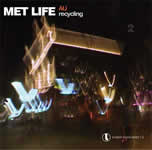|
|
 |
Dusted Reviews
Artist: AU Album: Met Life: Recycling Label: Locust Review date: Jun. 13, 2003 |

|
|
|
 |
Universal Truth and Cycles
As conceived, Locust Music’s “Met Life” series is open-ended enough to encourage a diversity of artistic responses to its call for a 21st century, urban renewal of the field recording. The parameters are loosely sketched – each participant is asked to capture a continuous, “unadulterated” environmental sound recording and then devise an interpretative response by manipulating the original sound document. An unspoken, though no less essential, series guideline necessitates that both the objective and subjective components of each release reflect an aura of the particular city in which they were created; Locust promises, “the sheer diversity of the forthcoming (‘Met Life’) releases willfully runs the stylistic and geographical gamut,” and here the particularities of style and geography feel inextricably bound.
In this way, the initial volumes of the series suggest that “Met Life” is less about the sounds of city than of specific cities worldwide. Not unlike the music recorded by Alan Lomax or Chris Strachwitz, part of the alchemic property of these field recordings derives from the temporal and geographical specificity of their origin, while the remainder of the alchemy transcends those details. The initial installment – Keith Fullerton Whitman’s Dartmouth Street Underpass – captures the hectic bustle of a Boston T-stop as machine and human sounds collide and reflect off cool, ultramodern glass. There’s both an agitating claustrophobia and buoyant energy to the bustle that feels quintessentially of place, and it’s a quality that Whitman brings to the forefront in the artist-manipulated portion of Underpass.
Whitman’s evocation struck me as a fairly appropriate one, though while I have been to Boston I have never visited The Hague. That said, if Holland’s cities are anything like other Northern European cities it’s safe to say that the bicycle is not only a popular means of transportation but also a central facet to the city’s identity – at least in the international context of “Met Life”. In bike-friendly Copenhagen, for instance, it’s only at a slow but steady speed that the bright lights of pubs and storefronts seem to truly cohere, and the streets only really stand still in tourist snapshots. Multimedia artists Jan Borchers and Paul Klaui (AU) capture this aura perfectly in their contribution to the “Met Life” series, Recycling. They move the series out of the packed, enclosed arena of a Boston subway station into the open streets of The Hague on a lively September night, recording from their bikes as they patrol the city (“Cycling”) and then manipulating the recording to emphasize something of the emotional quality of the open air and bright color of street life they pass (“Recycling”).
The proper field recording, “Cycling,” is a mesh of the familiar and the unexpected. By design, the most consistent sound is the incessant squeak of the bicycle seat and the click and whir of the chain as it moves across the gears. The rudimentary mechanical noises serve as a kind of compass for a moving mélange of sounds that the listener is enticed into deciphering as their proximities ebb and flow. Every honk of a car horn or rumble of a truck engine elapses at a moving volume and shifting location, and the ability to orient oneself becomes increasingly complex as stranger sounds begin to enter into the mix. At one point the sound of rushing water is heard quite prominently as the pair circle a fountain (at least, presumably), but the clack of heels across the sidewalk and low murmur of voices soon gain steady prominence as the sounds morph together with the connective rush of moving wind. Elements like these are an unexpected delight, and throughout “Cycling” the steady squeak of the bike seat identifies us with the rider/adventurer who boldly explores his physical and sonic terrain. As time elapses the sounds become increasingly dramatic – at one point a marching band overwhelms all other ambient noise, as Borchers and Klaui seem to almost weave their way between the thudding bass drums and swinging trumpet bells. Even after the parade finally dies down, one can still hear the occasional squonk of a tuba over the increasingly noticeable crowd roar. “Cycling” ends rather abruptly as the duo dismount their bicycles and head into a noisy pub.
With their manipulated portion, “Recycling,” AU very smartly emphasize the most compelling aspects of “Cycling” – namely, the various proximate effects that occur while recording in motion. To this end, AU lays down floating washes of guitar and analogue electronics that drift and reverberate at alternating intervals, accenting both the consistency of grinding pedals and the fleeting, elliptical quality of honking cars and drifting crowd noise. Space is subtly accentuated through these additions, and the multitude of sounds in “Cycling” – Borchers’ and Klaui’s bikes, the trickle of the fountain, the melody of the street parade – all intersect, intertwine, and dissipate on a wave of understated, ambient music in “Recycling”. Though subtle, something about the addition of the minor-key reverberations lends “Recycling” a moody quality of dread, a kind of sinister edge that seems to clash a bit with the sunny and more happily exploratory “Cycling.” Nevertheless, AU captures an aura of the open streets at night that feels appropriately wondrous – full of motion and emotion genuine to their city.
By Nathan Hogan
|







